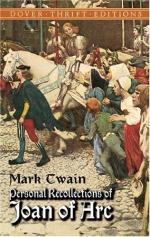The verdict made a prodigious stir. Dead France woke suddenly to life, wherever the great news traveled. Whereas before, the spiritless and cowed people hung their heads and slunk away if one mentioned war to them, now they came clamoring to be enlisted under the banner of the Maid of Vaucouleurs, and the roaring of war-songs and the thundering of the drums filled all the air. I remembered now what she had said, that time there in our village when I proved by facts and statistics that France’s case was hopeless, and nothing could ever rouse the people from their lethargy:
“They will hear the drums—and they will answer, they will march!”
It has been said that misfortunes never come one at a time, but in a body. In our case it was the same with good luck. Having got a start, it came flooding in, tide after tide. Our next wave of it was of this sort. There had been grave doubts among the priests as to whether the Church ought to permit a female soldier to dress like a man. But now came a verdict on that head. Two of the greatest scholars and theologians of the time—one of whom had been Chancellor of the University of Paris—rendered it. They decided that since Joan “must do the work of a man and a soldier, it is just and legitimate that her apparel should conform to the situation.”
It was a great point gained, the Church’s authority to dress as a man. Oh, yes, wave on wave the good luck came sweeping in. Never mind about the smaller waves, let us come to the largest one of all, the wave that swept us small fry quite off our feet and almost drowned us with joy. The day of the great verdict, couriers had been despatched to the King with it, and the next morning bright and early the clear notes of a bugle came floating to us on the crisp air, and we pricked up our ears and began to count them. One—two—three; pause; one—two; pause; one—two—three, again—and out we skipped and went flying; for that formula was used only when the King’s herald-at-arms would deliver a proclamation to the people. As we hurried along, people came racing out of every street and house and alley, men, women, and children, all flushed, excited, and throwing lacking articles of clothing on as they ran; still those clear notes pealed out, and still the rush of people increased till the whole town was abroad and streaming along the principal street. At last we reached the square, which was now packed with citizens, and there, high on the pedestal of the great cross, we saw the herald in his brilliant costume, with his servitors about him. The next moment he began his delivery in the powerful voice proper to his office:
“Know all men, and take heed therefore, that the most high, the most illustrious Charles, by the grace of God King of France, hath been pleased to confer upon his well-beloved servant Joan of Arc, called the Maid, the title, emoluments, authorities, and dignity of General-in-Chief of the Armies of France—”




